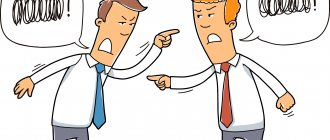January 19, 2021
Hello, dear readers of the KtoNaNovenkogo.ru blog. There is a state of the human psyche called affect. It does not occur often and not for everyone, but once it does occur, the person ceases to be himself.
Most often, this word is used as part of the phrase “state of passion,” which is talked about when trying to explain the state of a person who has committed illegal actions.
But what kind of affect is this? And why its presence can exempt you from liability even for very serious crimes.
What is affect
A state of affect is an acute emotional experience that arises in response to a dangerous situation. Affect is manifested by various reactions: facial expressions, motor activity and others. Being in this state, a person experiences strong emotional stress, his mental processes responsible for controlling behavior are slowed down. Behavioral responses to situations can be unpredictable and dangerous. During affect, a person’s volitional processes are limited, he is not aware of his behavior and is not able to control himself.
The main reason for the emergence of affective behavior is a potentially dangerous situation. The threat to life can be real or far-fetched, it doesn’t matter. A reaction will occur in any case if a person considers the threat to be real. An acute emotional experience is most often short-term: its duration does not exceed a few minutes. In the presence of mental disorders, it can last up to several hours. All this time the person is not aware of his actions. When mental processes are normalized, a person, as a rule, does not remember his actions.
All people are susceptible to affective reactions. For those whose volitional and moral qualities are sufficiently developed, reactions are short-term and occur easily, without going beyond the boundaries of normal behavior. In aggressive people, sudden attacks of destructive behavior occur much more often and can lead to devastating consequences.
Treatment
Psychotherapy is most effective in combating emotional states
If a person is in an insane state, then consultation with a psychologist or psychotherapist and qualified assistance is mandatory.
- The psychotherapist determines the behavioral characteristics of an individual with affect that lead to a worsening of his symptoms. The specialist establishes patterns of destructive actions that affect the decrease in adaptability.
- Cognitive-behavioral therapy can be used, in which the psychotherapist teaches the patient how to switch his negative mood to a positive one, control emotions, and correctly respond to the influence of stress factors.
- If depression is present, antidepressants are prescribed, as well as lifestyle modifications.
- If the patient has psychosis, antidepressants as well as antipsychotics may be prescribed. If medication is not possible, electroconvulsive therapy may be prescribed.
- Euphoria or mania requires taking antipsychotics and mandatory hospitalization.
- For psychogenic depression, it is necessary to take antidepressants and sedatives.
Types of affect
Short-term affect is a psychological process that can be either a normal reaction to a stressor or a pathological one. The following types of affect are distinguished:
- Physiological. Is a normal response to a stress factor. Appears in situations of emotional stress. Manifestations are moderate and do not go beyond social norms. It occurs quickly and progresses very quickly. Mental activity remains unchanged. Often a person does not attach importance to the change in his condition and does not experience any inconvenience.
- Pathological. A painful mental state that occurs in a healthy person in response to a traumatic situation. It develops rapidly, quickly moving from the preparatory phase to the explosion phase. The activity of mental manifestations depends on the characteristics of a person’s personality. People with disorders of the central nervous system, an unbalanced cycle of excitation and inhibition processes, are prone to pathological affect. The main form of pathological affect is verbal and physical aggression.
- Affect of inadequacy. It differs from other types in its duration - the affect of inadequacy is a stable experience. It arises from the inability of the individual to carry out the desired action. It is a normal reaction of children of primary preschool age, whose volitional processes have not yet been formed. If a child cannot get his needs met, he will become anxious, panicked, angry, or upset. As he gets older, he gradually learns to manage his emotional reactions. But if this does not happen, affective behavior is reinforced as the only emotional response. Children whose upbringing is not given due attention become aggressive, touchy, and prone to negativism.
The formation and consolidation of negative character traits in a person is the main condition for the manifestation of pathological affective reactions. Thus, awareness of one’s negative traits and subsequent therapy can reduce the intensity of the pathological reaction. And denying your responsibility for your own emotional state makes the situation worse.
Modern consideration of the problem
Although it is still customary to primarily consider burnout in the social sphere, science has proven that this can happen in any profession, although human-to-human work remains the main risk group.
In modern thinking, emotional burnout is interpreted as a professional crisis in any work activity. It is connected with the activity and self-awareness of a person, and not with interpersonal relationships within the framework of work.
Then the components of the burnout structure change:
- exhaustion remains the same, but there is a greater risk of intrapersonal conflict and a crisis of the meaning of life;
- cynicism extends to the attitude towards the activity itself, its product (quality suffers);
- reduction is replaced by professional efficiency (the performance of work is simplified).
Functions and phases
Each affect goes through 3 stages of development:
- Preparatory. This stage can develop rapidly, or it can last quite a long time. It occurs immediately after a situation of irritation in the form of an emotional reaction. The person practically loses self-control, but is still able to recognize reality. At this stage, he can still cope with his emotions and not go into an attack situation. But if a person does not have time or does not even try to stop, the emotional reaction moves to the second stage.
- Emotional explosion. The stage of immediate uncontrollable outburst of emotions. At this stage, a person can no longer be aware of his actions and is capable of extremely destructive acts, including assault and murder.
- Final. At this stage, the person feels intense devastation caused by the previous emotional outburst. What happened is erased from memory or replaced by false memories, the person is not yet aware of his actions, his psyche needs rest and a “reboot.”
A state of affect can manifest itself even in a person who is not prone to aggression and negativism. It all depends on the degree of danger of the situation and additional factors, for example, the need to protect not only your life, but also the lives of other people. In this case, the course of physiological processes changes so much that the person becomes capable of extraordinary actions. For example, the mother of a child who has been run over by a car can lift it with her bare hands and hold it until the child can get the necessary help.
Literature
- Affect: the practice of forensic psychological and psychiatric examination. Reader / Authors-compilers F.S. Safuanov, E.V. Makushkin. - M.: Federal State Budgetary Institution "GNTsSSP im. V.P. Serbsky" Ministry of Health of Russia, 2013. - 312 p.
- Affect // Encyclopedic Dictionary of Brockhaus and Efron: in 86 volumes (82 volumes and 4 additional). - St. Petersburg, 1890-1907.
- Balabanova L. M..
Emotions and feelings Agape · Antipathy · Apathy · Anxiety · Reverence · Gratitude · Fear · Guilt · Attraction · Infatuation · Indignation · Admiration · Hostility · Anger · Pride · Sadness · Annoyance · Pity · Envy · Confusion · Gloating · Anger · Amazement · Interest · Love · Metanoia · Hope · Tension · Tenderness · Hate · Rejection · Uncertainty · Nostalgia · Resentment · Sadness · Loneliness · Disgust · Despair · Contempt · Sadness · Disdain · Attachment · Joy · Irritation · Frustration · Remorse · Jealousy · Sympathy · Grief · Boredom · Storge · Happiness · Regret · Passion · Fear · Shame · Longing · Anxiety · Trembling · Infatuation · Surprise · Confidence · Satisfaction · Pleasure · Humiliation · Philia · Frustration · Euphoria · Enthusiasm Affects Fear · Panic · Terror · Euphoria · Ecstasy · Rage Moods Boredom · Dejection · Hypotymia · Hyperthymia This is a draft article on psychology. You can help the project by adding to it.
Signs of a state of passion
You can identify a person in a pre-affective state by his facial expressions and physical activity. His body does not seem to obey him, and moves on its own. The facial expression becomes distant, the gaze becomes glassy and empty. When the psyche is restored, a person cannot remember and describe what happened to him. He feels as if he was acting under someone's external direction.
Affect is a state of extreme excitement. It is possible to distinguish an adequate emotional reaction from a pathological one by individual signs. In psychiatry, there are three levels of development of emotional reactions, at each of which certain changes in well-being and behavior occur:
- Clinical feeling reactions that depend on the satisfaction or unsatisfaction of needs.
- Neurobiological manifestations: hormonal, somatic and autonomic reactions.
- Mental manifestations associated with instinctive reactions that do not receive timely release.
The ability to recognize and timely identify a person close to an emotional outburst can help prevent the commission of a crime. Since emotional reactions cannot be controlled, the best thing people who are around a potentially dangerous person can do is try to stop all communication and provide timely psychological help.
The structure of emotional burnout
Emotional burnout includes 3 components: emotional exhaustion, cynicism and simplification of achievements (personal and professional). Let's look at each element in more detail.
Emotional exhaustion
This feeling:
- eternal fatigue;
- dissatisfaction;
- emptiness in relation to work and, as a rule, other areas of life.
If work takes up the bulk of an adult’s time, then it is logical that it is the fundamental basis of a person’s relationship to the whole world. If there is no meaning in work, then it disappears in other areas. Over time, complete apathy and, of course, cynicism develop.
Cynicism
Depersonalization, or a cynical attitude towards everything that happens, is another characteristic element of emotional burnout. If we say that burnout is more common in social professions, then in this context cynicism implies:
- immoral, inhumane, indifferent attitude towards clients;
- transfer of relations from subject-subject to subject-object.
Suffice it to recall the angry women sitting in the windows of public service institutions, doctors who always have no time and “they gave a prescription, what else is needed.” All these are signs of emotional burnout and, one might say, hatred of work.
Reduction of achievements
Reduction – simplification (from complex to simple). But this is not so much about a decrease in productivity, but about personal and professional depreciation. The specialist does not feel his competence, but feels failure in the professional field. This reduces self-esteem.
Causes
The term affectivity in psychology has a clear definition. Based on it, it is possible to determine the reasons that cause changes in psycho-emotional reactions. Such reasons include:
- a conflict that is significant for a particular person;
- direct or indirect threat to life;
- excessive demands or unjustified expectations;
- inability to achieve what you want;
- threat to a person's self-determination, doubt in value, affecting self-esteem.
For each person, the intensity of the manifestation of emotions will be individual. In the same situation, some people are able to control themselves, while others lose self-control in the first minutes. Their anger cannot be tamed: in their normal state such people are benevolent, but passion removes all moral principles and turns them into monsters. When they return to normal, they cannot believe that they were capable of such behavior. The less developed the structure of a person’s nervous system, the faster he succumbs to the influence of the situation.
The essence of the phenomenon
The first studies and notes on a decrease in psychological stability and performance, refusal to perform actions in demanding situations caused by prolonged exposure to stress, belong to the American psychologist Richard Lazarus and the Canadian doctor Hans Selye.
The terms “burnout” and “mental burnout” were introduced by the American psychiatrist Herbert Freudenberger in 1974. Then the author thus characterized all employees experiencing chronic stress, provoked by abundant and highly emotional communication with clients, or in areas with increased emotional stress and responsibility.
At the same time, only doctors and social workers were classified as such professions, but soon this list became much wider:
- policemen,
- prison guards,
- guards,
- military,
- doctors,
- social workers,
- politicians,
- lawyers,
- managers,
- sellers.
Thus, emotional burnout refers to the depletion of physical, psychological (emotional) and intellectual strength. And in modern thinking, the risk group includes all professions where you have daily contact with many other people:
- teachers of all spheres and levels of education;
- doctors and medical staff;
- psychologists and psychiatrists;
- social workers;
- veterinarians;
- employees of law enforcement agencies and the penitentiary system;
- trainers;
- judges;
- employees of the Ministry of Emergency Situations;
- security guards;
- customs officers;
- managers and agents;
- athletes;
- operators;
- drivers;
- pharmacists;
- artists;
- other professions of the “person-to-person” type.
Understanding in Psychology
To understand the structure of affect and the reasons for its occurrence, you should have a clear understanding of the characteristics of mental processes, in particular emotions.
Emotions are a person’s response to an external or internal stimulus and the result of the actions of the stimulus. The action can be long-term and regular, or one-time and fleeting. An emotional response normally does not cause destructive consequences. A mentally healthy person is able to distinguish between his emotions and prevent their occurrence or sublimate them in a socially acceptable form.
In psychology, affect is a short-term emotional experience that differs from the normal expression of emotions. A person is aware of his emotional manifestations and perceives them as an integral part of his personality. The affective state is alien, it occurs against the will. Arising unexpectedly, it disrupts the functioning of consciousness and can lead to pathological consequences for the psyche.
The affective state is one of the mental abilities to cope with a stressful situation. The main task of consciousness is to preserve human life and health. In a situation that is assessed as dangerous, it turns on “emergency mode” and mobilizes psychological and physical resources. Therefore, after the end of the affective reaction, a person feels devastated and often cannot understand what happened to him. Partial amnesia is a way for the psyche to protect consciousness from processing traumatic information.
A decrease in the functioning of higher mental functions leads to maladjusted behavior: if a person commits a crime while under the influence of passion, he is not able to take responsibility for his actions. The court considers the emotional state as a mitigating circumstance.
Useful tips
If you consider yourself an overly sensitive and vulnerable person, and are also afraid that you will soon lose your temper, pay attention to strengthening your nervous system. To do this, use one of the effective methods to prevent the development of affects:
- Regular exercise. You don't have to rush headlong to the nearest gym. Replace trips to the store with walking, take the stairs, get off the bus a couple of stops before your home.
- Yoga. According to psychologists, it is very useful for frequent affective states. Smooth movements will help relax not only the body, but also the mind. Your blood circulation and breathing will also improve.
- Relaxation. Gradually relax all parts of the body, starting from the head and working downwards. This will help you feel like you are in control of the situation. And control, in turn, will reduce the risk of developing a state of passion.
- Massage. Like relaxation, it gives a sense of self-control and also helps relieve tension.
- Reflexology. This is an acupressure massage, often combined with aromatherapy or hydrotherapy. Stimulating certain points of the human body allows you to relax all muscles and calm down.
- Meditation. It helps to distract yourself, get rid of fear, and at least temporarily distance yourself from reality and irritating factors. You will find absolute peace and get rid of negative emotions. Do a simple exercise: you need to choose any word or phrase. Afterwards, in a sitting position, close your eyes and relax. Focus on your breathing, repeating the spoken word in rhythm with it as you exhale. Do this for 10-20 minutes and daily if possible.
- Autogenic training. Essentially, this is the same self-hypnosis. Repeat that you do not have any problems, that there is no need to instantly react to the situation, that you urgently need to relax.
- Color therapy. Everyone knows that colors have a certain influence on a person’s psyche and mood. For example, green is calming. Use it in your wardrobe and interior design.
- Homeopathy. Controversial method of treating affective states. Therefore, it can only be carried out under the supervision of a specialist.
If there are no contraindications, you can strengthen the nervous system with the help of medicinal herbs. They will help you cope with uncontrollable behavior, improve your mood, and get rid of emotional stress.
Mint or ginseng tea effectively soothes. You can also add lemon balm to it or purchase ready-made soothing herbal infusions.
In criminal law
For criminal law, a state of passion is regarded as a partial atrophy of the lability of thinking, a weakening of the thought process. A person is unable to control his actions because all his attention is focused on the trigger. In this state, he is capable of committing any illogical act. If a forensic examination can prove that a person was truly unable to take responsibility for his actions, the court will recognize this as a mitigating circumstance.
In criminal law, the reasons leading to inappropriate manifestations are clearly regulated. These include:
- bullying and insults directed at third parties;
- prolonged stay in a traumatic situation;
- emotional or physical abuse;
- immoral behavior of the victim.
Affect cannot be predicted. The person himself and other people who unwittingly become provocateurs may suffer from its manifestation. Since the victim is not able to predict in advance what may lead to an emotional outburst, and the offender is not able to predict his reaction, an affective state is a one-time reaction to a specific action and cannot be regarded as an intentional action.
Characteristic manifestations
Mandatory manifestations include:
- suddenness of reaction;
- subjective significance of traumatic influences;
- an explosion of emotions;
- loss of connection with reality;
- partial perception of events;
- loss of self-control;
- presence of physical exhaustion.
Additional ones include:
- subjective feeling of hopelessness, hopelessness;
- sleep problems;
- constant fatigue;
- depersonalization;
- distortion of perception;
- disorganization.
Signs of a pathological type of affect include:
- facial changes;
- disorganization;
- failure of mental processes;
- spontaneous actions;
- somatic health problems (tremors, headache, nausea, sweating, ringing in the ears);
- psychophysical exhaustion.
A person in a state of passion may simultaneously have increased anxiety and a depressive disorder.











